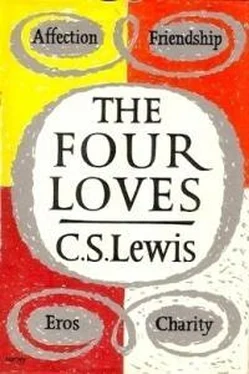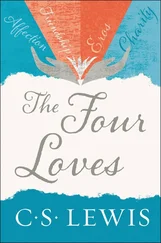This is the grandeur and terror of love. But notice, as before, side by side with this grandeur, the playfulness. Eros, as well as Venus, is the subject of countless jokes. And even when the circumstances of the two lovers are so tragic that no bystander could keep back his tears, they themselves—in want, in hospital wards, on visitors' days in jail—will sometimes be surprised by a merriment which strikes the onlooker (but not them) as unbearably pathetic. Nothing is falser than the idea that mockery is necessarily hostile. Until they have a baby to laugh at, lovers are always laughing at each other.
It is in the grandeur of Eros that the seeds of danger are concealed. He has spoken like a god. His total commitment, his reckless disregard of happiness, his transcendence of self–regard, sound like a message from the eternal world.
And yet it cannot, just as it stands, be the voice of God Himself. For Eros, speaking with that very grandeur and displaying that very transcendence of self, may urge to evil as well as to good. Nothing is shallower than the belief that a love which leads to sin is always qualitatively lower—more animal or more trivial—than one which leads to faithful, fruitful and Christian marriage. The love which leads to cruel and perjured unions, even to suicide–pacts and murder, is not likely to be wandering lust or idle sentiment. It may well be Eros in all his splendour; heartbreakingly sincere; ready for every sacrifice except renunciation.
There have been schools of thought which accepted the voice of Eros as something actually transcendent and tried to justify the absoluteness of his commands. Plato will have it that "falling in love" is the mutual recognition on earth of souls which have been singled out for one another in a previous and celestial existence. To meet the Beloved is to realise "We loved before we were born". As a myth to express what lovers feel this is admirable. But if one accepted it literally one would be faced by an embarrassing consequence. We should have to conclude that in that heavenly and forgotten life affairs were no better managed than here. For Eros may unite the most unsuitable yokefellows; many unhappy, and predictably unhappy, marriages were love–matches.
A theory more likely to be accepted in our own day is what we may call Shavian—Shaw himself might have said "metabiological"—Romanticism. According to Shavian Romanticism the voice of Eros is the voice of the élan vital or Life Force, the "evolutionary appetite". In overwhelming a particular couple it is seeking parents (or ancestors) for the superman. It is indifferent both to their personal happiness and to the rules of morality because it aims at something which Shaw thinks very much more important: the future perfection of our species. But if all this were true it hardly makes clear whether—and if so, why—we should obey it. All pictures yet offered us of the superman are so unattractive that one might well vow celibacy at once to avoid the risk of begetting him. And secondly, this theory surely leads to the conclusion that the Life Force does not very well understand its (or her? or his?) own business. So far as we can see the existence or intensity of Eros between two people is no warrant that their offspring will be especially satisfactory, or even that they will have offspring at all. Two good "strains" (in the stockbreeders' sense), not two good lovers, is the recipe for fine children. And what on earth was the Life Force doing through all those countless generations when the begetting of children depended very little on mutual Eros and very much on arranged marriages, slavery, and rape? Has it only just thought of this bright idea for improving the species?
Neither the Platonic nor the Shavian type of erotic transcendentalism can help a Christian. We are not worshippers of the Life Force and we know nothing of previous existences. We must not give unconditional obedience to the voice of Eros when he speaks most like a god. Neither must we ignore or attempt to deny the god–like quality. This love is really and truly like Love Himself. In it there is a real nearness to God (by Resemblance); but not, therefore and necessarily, a nearness of Approach. Eros, honoured so far as love of God and charity to our fellows will allow, may become for us a means of Approach. His total commitment is a paradigm or example, built into our natures, of the love we ought to exercise towards God and Man. As Nature, for the Nature lover, gives a content to the word glory , so this gives a content to the word Charity . It is as if Christ said to us through Eros, "Thus—just like this—with this prodigality—not counting the cost—you are to love me and the least of my brethren." Our conditional honour to Eros will of course vary with our circumstances. Of some a total renunciation (but not a contempt) is required. Others, with Eros as their fuel and also as their model, can embark on the married life. Within which Eros, of himself, will never be enough—will indeed survive only in so far as he is continually chastened and corroborated by higher principles.
But Eros, honoured without reservation and obeyed unconditionally, becomes a demon. And this is just how he claims to be honoured and obeyed. Divinely indifferent to our selfishness, he is also demoniacally rebellious to every claim of God or Man that would oppose him. Hence as the poet says:
People in love cannot be moved by kindness,
And opposition makes them feel like martyrs.
Martyrs is exactly right. Years ago when I wrote about medieval love–poetry and described its strange, half make–believe, "religion of love," I was blind enough to treat this as an almost purely literary phenomenon. I know better now. Eros by his nature invites it. Of all loves he is, at his height, most god–like; therefore most prone to demand our worship. Of himself he always tends to turn "being in love" into a sort of religion.
Theologians have often feared, in this love, a danger of idolatry. I think they meant by this that the lovers might idolise one another. That does not seem to me to be the real danger; certainly not in marriage. The deliciously plain prose and business–like intimacy of married life render it absurd. So does the Affection in which Eros is almost invariably clothed. Even in courtship I question whether anyone who has felt the thirst for the Uncreated, or even dreamed of feeling it, ever supposed that the Beloved could satisfy it. As a fellow–pilgrim pierced with the very same desire, that is, as a Friend, the Beloved may be gloriously and helpfully relevant; but as an object for it—well (I would not be rude), ridiculous. The real danger seems to me not that the lovers will idolise each other but that they will idolise Eros himself.
I do not of course mean that they will build altars or say prayers to him. The idolatry I speak of can be seen in the popular misinterpretation of Our Lord's words "Her sins, which are many, are forgiven her, for she loved much" ( Luke VII, 47). From the context, and especially from the preceding parable of the debtors, it is clear that this must mean: "The greatness of her love for Me is evidence of the greatness of the sins I have forgiven her." (The for here is like the for in "He can't have gone out, for his hat is still hanging in the hall"; the presence of the hat is not the cause of his being in the house but a probable proof that he is). But thousands of people take it quite differently. They first assume, with no evidence, that her sins were sins against chastity, though, for all we know, they may have been usury, dishonest shopkeeping, or cruelty to children. And they then take Our Lord to be saying, "I forgive her unchastity because she was so much in love." The implication is that a great Eros extenuates—almost sanctions—almost sanctifies—any actions it leads to.
Читать дальше











